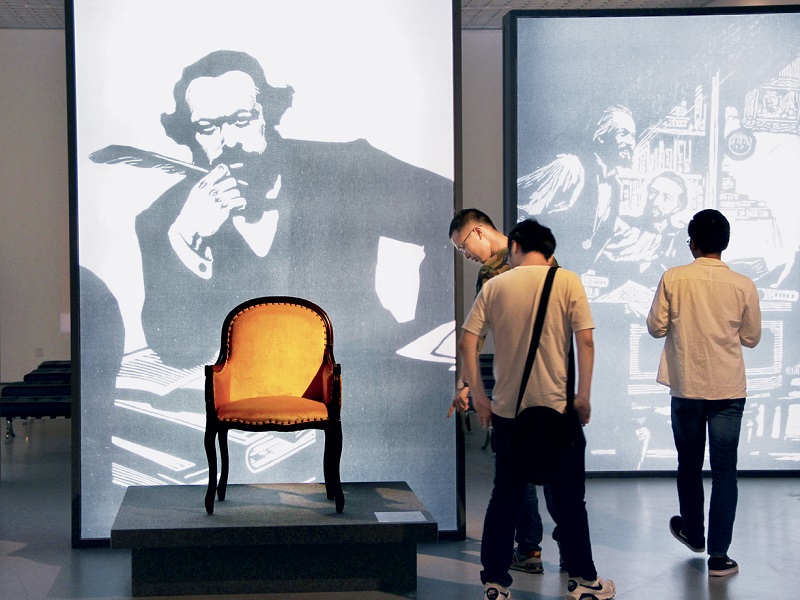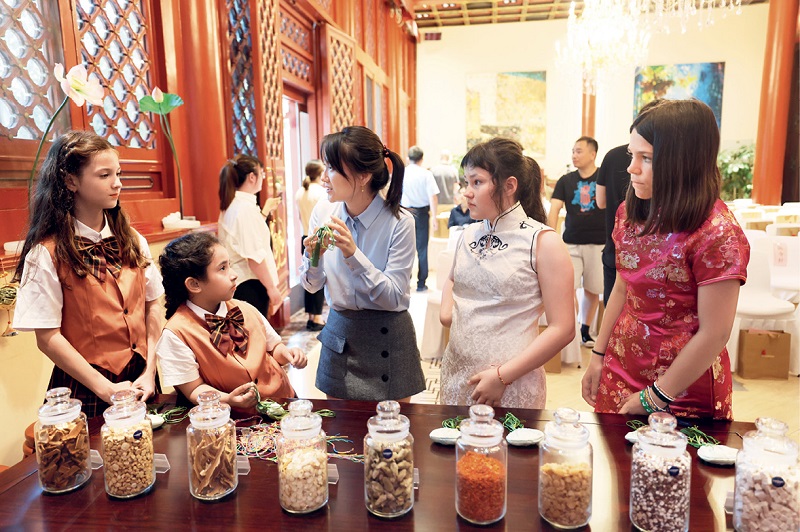Exchanges should be encouraged to help the garden of world civilization flourish, as the future of all countries is closely connected.

Karl Marx’s study in London where he wrote the masterwork Capital is showcased at the historical literature exhibition “Commemorating the 200th Anniversary of Karl Marx’s Birthday” at the Nanjing University’s Art Museum, on May 4, 2018.
Humanity has a history of civilization dating back millennia. While civilizations arose and developed on different continents and at different times, they prospered and innovated through mutual exchanges and mutual learning. The ancient Silk Road, which began in China, is one of the greatest examples of this.
Through such a network of routes, Roman remains have been found in China and Chinese silk and coin remains were found in the markets of Ancient Rome. Meanwhile, Admiral Zheng He (1371-1433) introduced the products of Chinese civilization from South East Asia to East Africa, while merchants and traders from the Middle East found their way to China, becoming in time part of the great, diverse but united family of the Chinese nation.
Of course, previous history, since primitive communism gave way to a class society, was by no means devoid of conflict, but it was, above all, the rise of capitalism and modern imperialism, which, from 1492 especially, fundamentally disrupted humanity’s inter-civilizational relationships.
As Karl Marx put it in Volume One of his most celebrated work, Capital: A Critique of Political Economy (also simply known as Capital):
“The discovery of gold and silver in America, the extirpation, enslavement and entombment in mines of the aboriginal population, the beginning of the conquest and looting of the East Indies, the turning of Africa into a warren for the commercial hunting of black-skins, signaled the rosy dawn of the era of capitalist production.”
Exchange and cooperation between civilizations were replaced by conflict and oppression. Powerful forces in the West are still unable to fundamentally break from this essential paradigm. This, for example, is what animates the dystopian theory of the “clash of civilizations,” put forward by the late U.S. academic Samuel Huntington, writing in the 1990s, in the wake of the dramatic events over the preceding decade, from the collapse and dissolution of the Soviet Union to the Iraq War.

A photo of the British booth at the bazaar for imported goods in Shanghai’s busiest shopping street — Nanjing Road on May 1, 2021.
There is one leader and one statesman in the contemporary world who is advancing a fundamentally different paradigm: One advocating such common human values as peace, development, fairness, justice, democracy, and freedom; one insisting that different approaches to modernization can be pioneered and developed and have every right to do so.
On March 15 this year, I was privileged to participate in the online CPC in Dialogue with World Political Parties High-level Meeting and to hear Chinese President Xi Jinping unveil the Global Civilization Initiative, the latest of his programmatic initiatives designed to realize a community of shared future for humanity.
As Xi noted: “All civilizations created by human society are splendid. They are where each country’s modernization drive draws its strength and where its unique features come from. Transcending time and space, they have jointly made an important contribution to humanity’s modernization process. Chinese modernization, as a new form of human advancement, will draw upon the merits of other civilizations and make the garden of world civilizations more vibrant.”
Countries, Xi explains, need to keep an open mind in appreciating the values of different civilizations and they should refrain from imposing their own values or models on others and from stoking ideological confrontation.
This represents a fundamentally different concept and approach from that practiced by the various colonial and now neocolonial powers for the last more than 500 years, up to and including the present. However, it fully accords with the sentiments and interests of the vast mass of developing countries and their peoples, the overwhelming majority of humanity, and the inheritors of great, ancient and time-honored civilizations.

Foreign children are learning about the custom of making traditional Chinese medicine sachets during the Dragon Boat Festival in Beijing, on June 21, 2023.
Moreover, it also accords with the objective interests of the great majority of populations in every country, whether developing or developed.
Such existential threats to humanity as impending climate catastrophe, zoonotic pandemics, and nuclear annihilation, along with numerous other challenges, from terrorism and cybercrimes, to the challenges and opportunities of artificial intelligence, cannot be solved simply behind national barriers or with a beggar-thy-neighbor or “winner takes all” mentality. Nor can all peoples’ need for peace and development be realized in this way.
As Xi has indicated on many occasions, socialism with Chinese characteristics offers a new option for those countries that wish to rapidly develop their economies while maintaining their independence. This is an important example of the contribution of Chinese wisdom and Chinese experience to the quest for sustainable solutions to the problems facing humanity.
Xi’s concept of a community of shared future for humanity is an important component of Xi Jinping Thought on Socialism with Chinese Characteristics for a New Era and a further step in the “Sinification of Marxism.” As such, it has deep roots in the theory and practice of the Chinese revolution.
In one of his most famous and celebrated articles, Chairman Mao wrote of Dr. Norman Bethune:
“What kind of spirit is this that makes a foreigner selflessly adopt the cause of the Chinese people’s liberation as his own? It is the spirit of internationalism, the spirit of communism.”
Today, we can also say that it is the spirit of a community of shared future, the only viable option for humanity. 
KEITH BENNETT is a consultant and analyst on international relations and co-editor of Friends of Socialist China based in London.